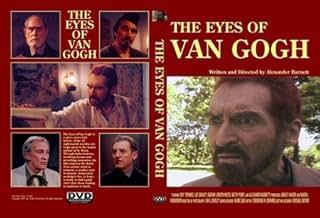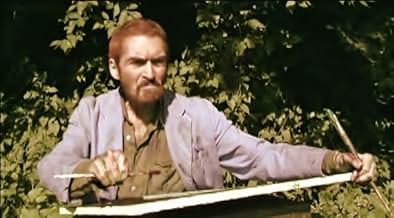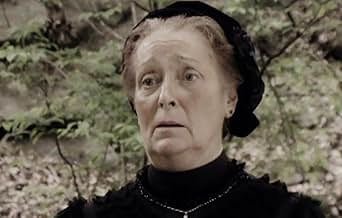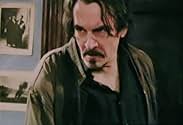Aggiungi una trama nella tua linguaAfter the disastrous months spent with Gauguin in the yellow house in Arles, Vincent van Gogh, in desperate search for a cure from attacks that increasingly plague him, voluntarily enters an... Leggi tuttoAfter the disastrous months spent with Gauguin in the yellow house in Arles, Vincent van Gogh, in desperate search for a cure from attacks that increasingly plague him, voluntarily enters an insane asylum.After the disastrous months spent with Gauguin in the yellow house in Arles, Vincent van Gogh, in desperate search for a cure from attacks that increasingly plague him, voluntarily enters an insane asylum.
- Regia
- Sceneggiatura
- Star
- Premi
- 1 vittoria e 1 candidatura in totale
Diana Agostini
- Kee Vos
- (as Diane Agostini)
Recensioni in evidenza
10jlasko
Some movies are entertaining. Others are an experience. Alexander Barnett's Van Gogh biopic definitely falls into the latter category. Far from "guilty pleasure" fare, "The Eyes of Van Gogh" is a skillful and passionate portrayal of a talented yet tortured artist. This movie will educate you about the world of this struggling genius, even as it compels you to feel compassion for Van Gogh in his sad state. Competition, debt, insanity, rejection--all of these themes swirl Vincent's reality much like the colors in his paintings...you'll be relieved to view reality for yourself again at the end. But if you let it, the movie may remind you of all you have to be grateful for, and even challenge you to look at your own life through slightly different eyes.
History tells us that Van Gogh, like many artists, was a very intense and troubled personality. Barnett takes us into the heart and mind of the man in a way that causes us to empathize afresh with his feelings and struggles. Barnett the film-maker deliberately refrains from any cutting from one camera to another, enhancing the viewer's being drawn into the world as viewed from Van Gogh's perspective. The score is also effective in painting an aural picture of what is going on inside the artist's mind. In this film we see Van Gogh, not just as a troubled soul, but as a sensitive and caring person who never quite found the way to break free of the demons from his past that haunted him up to the end of his life. Barnett's portrayal of Van Gogh is both believable and engaging. Despite the film's length of almost two hours, it holds the viewer's attention and moves the heart.
Mr. Barnett's ability to move us directly into the anguished reality of the genius who was Vincent Van Gogh is startling, unflinching, and profound.
He reflects to us the inexorable tragedy brought on by the deeply flawed relationship between the Van Gogh brothers, compounded by the confusion and bitter poverty of being unseen by his peers, misconstrued by the world at large. Yet no one was more in touch with the blazing pulse of creation than this tormented man, whose transcendent work has touched us all.
To be confronted with such a life, and such a film, is not for the faint of heart; like Van Gogh's restless and fiery art, Barnett's script is uncompromising -- and his acting powerful.
He reflects to us the inexorable tragedy brought on by the deeply flawed relationship between the Van Gogh brothers, compounded by the confusion and bitter poverty of being unseen by his peers, misconstrued by the world at large. Yet no one was more in touch with the blazing pulse of creation than this tormented man, whose transcendent work has touched us all.
To be confronted with such a life, and such a film, is not for the faint of heart; like Van Gogh's restless and fiery art, Barnett's script is uncompromising -- and his acting powerful.
Having seen some of Barnett's earlier work on stage in N.Y., I was more than familiar with the depth and breadth of his ability as an actor and director; how seemingly effortlessly he brings each of his characters to life. I was fully prepared to be equally moved by his interpretation and portrayal of Vincent van Gogh. I knew that Barnett could be electrifying on stage and I was curious to see how his energy would translate on film.
Nothing, however, prepared me for the emotional shock I experienced by his haunting rendering of the most tortured months in the life of van Gogh. The intensity that Barnett brought to this role can only be described as "insane." One can but imagine the years of research and total immersion into the life of van Gogh it must have required to be able to portray with such shocking clarity what was in van Gogh's heart and mind during this brief period of time. Another commenter describes Barnett's performance as, "as close to insanity as you will ever get." I agree.
The film is not highly polished in the typical sense. The lighting is poor at times, the sets and scenery drab, and while I know nothing about film editing, I found some of the flashbacks unnecessarily confusing. These perceived flaws could be due to budget constraints, but knowing something of Barnett's work, I tend to think there is some intention on his part. The overall effect is that the viewer experiences the bleakness that is Vincent's life at the time. At times in the film, what is reality and what is only in van Gogh's tortured and clouded mind is as indistinguishable to the viewer as it is to Vincent, making the viewing experience all the more haunting and disquieting. An amazing feat, whether intentional or not.
Nothing, however, prepared me for the emotional shock I experienced by his haunting rendering of the most tortured months in the life of van Gogh. The intensity that Barnett brought to this role can only be described as "insane." One can but imagine the years of research and total immersion into the life of van Gogh it must have required to be able to portray with such shocking clarity what was in van Gogh's heart and mind during this brief period of time. Another commenter describes Barnett's performance as, "as close to insanity as you will ever get." I agree.
The film is not highly polished in the typical sense. The lighting is poor at times, the sets and scenery drab, and while I know nothing about film editing, I found some of the flashbacks unnecessarily confusing. These perceived flaws could be due to budget constraints, but knowing something of Barnett's work, I tend to think there is some intention on his part. The overall effect is that the viewer experiences the bleakness that is Vincent's life at the time. At times in the film, what is reality and what is only in van Gogh's tortured and clouded mind is as indistinguishable to the viewer as it is to Vincent, making the viewing experience all the more haunting and disquieting. An amazing feat, whether intentional or not.
I was truly astonished to see what can be accomplished with a low budget combined with obvious passion and commitment. I have always been a great fan of Roy Thinnes and was delighted to be able to see him again. There have been a couple of films about van Gogh. This one, I believe, captures him more truly and believably than any other I have seen. His torment is palpable and fully understandable. This film is about what happens when extraordinary people are for whatever reason unable to fully realize all of their potential. And yet, despite all, they must persevere. An outstanding performance by Alexander Barnett, who also wrote the screenplay.
Lo sapevi?
- QuizIn 2015, the Van Gogh Museum in Amsterdam will commemorate the 125th anniversary of van Gogh's death. They will be showing clips from the film The Eyes of Van Gogh throughout the year.
- Citazioni
Vincent van Gogh: I must finish my work.
I più visti
Accedi per valutare e creare un elenco di titoli salvati per ottenere consigli personalizzati
Dettagli
- Tempo di esecuzione1 ora 51 minuti
- Colore
Contribuisci a questa pagina
Suggerisci una modifica o aggiungi i contenuti mancanti

Divario superiore
By what name was The Eyes of Van Gogh (2005) officially released in India in English?
Rispondi






















